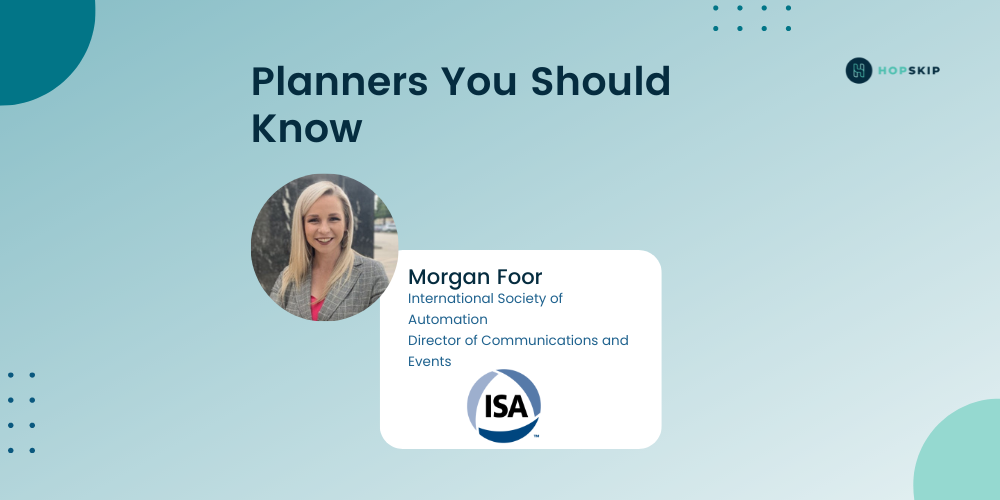This post is part of the HopSkip Planner Spotlight Series where HopSkip spotlight's planners across the industry to bring awareness of how they adapted to COVID-19, communicating and lessons learned and sharing how they are viewing the meetings and events industry in a post-pandemic world.
Name: Morgan Foor
Company Name: International Society of Automation
Job Title: Director of Communications and Events
Years of Experience: 10+
How did you get your start in the events industry? What made you pursue this role?
I was the social chair for my sorority in college and I planned an event at the South Carolina Governor's Mansion. The Mansion Complex Coordinator was impressed with the event and asked me if I was interested in working there assisting with the organization of state economic development events. It was an amazing opportunity I couldn't pass up and it jumpstarted my career.
How do you compare planning your first in-person event post-pandemic, to planning meetings/events pre- Covid? What was different and unique? What was similar?
Before Covid, the "build it and they will come" Field of Dreams ideology was the general philosophy. We focused on having good content for technical events to ensure an audience. Now, to grant a reasonable in-person turnout you have to provide a lot more for attendees. First, you have to make sure attendees feel safe at the event with appropriately advertised Covid protocols in addition to a really good program. Then, venues need to be more conveniently located, networking interaction and attendee participation needs to be boosted, and some sort of technology demonstration, entertainment, or food needs to be added for additional draw because many companies no longer have lenient budgets allowing employees to participate in events. The format of technical events has not changed much, but the willingness of the individual to attend and an event in-person has definitely changed.
What was your number one challenge in hosting your first in-person event(s) and how did you overcome it?
The greatest challenge is getting attendees to want to pay to attend an in-person event again. Virtual events with similar content have been free and more convenient for the last 2 years. We overcame this by starting with smaller localized events to target our audiences better. We picked an area like Houston, TX, found a sponsor with a large market presence to help us promote, included more interaction like technology demonstrations and games with good prizes, and priced the conference low to assist with getting demand back up.
What is the top learning that you uncovered from the last two years that you’re implementing in your planning process today? (any other tips or tricks you want to share?)
On-Demand and virtual content is never going away and is an expected option for all events now. If you're not offering an event as a hybrid, you're missing an opportunity for global engagement. In the future, we will offer on-demand events at a subscription price to actually be able to charge for our conference content on the virtual and in-person format. We also encourage live attendance by advertising unique offerings to in-person paying attendees like special guest speakers, food, and additional networking opportunities.
With hotels short-staffed, and RFP lead time shortening, what is your advice to other planners to overcome these obstacles when requesting hotels for proposals?
Plan well in advance. As soon as you think you might have an event, send an RFP to get an idea of what's available. I do RFPs before we decide topics or official locations. Also, go to events with hotels like ASAE, convention bureau events, or any event where you can speak to a live person about availability is always a great option to assist with the process.
Are you approaching contracting with hotels differently, post-pandemic?
I always ensure there is a clause that covers us from losing the entire event if another Covid wave hits in the area.
What is the biggest area of improvement that you think hotels can make when either responding to your RFPs or during the contract phase of your event?
Try to keep the same contact. The turnover rate is high right now and it is increasingly more difficult to get an RFP and an agreement with a hotel if the contact at the hotel changes during the process.
Due to the pandemic, our events community had to evolve, adapt, and grow. Many planners started to embrace new technologies as a result of the pandemic. What new tech are you using today in your planning process as a result?
We use a virtual event platform system with a built in event app, which really links the live and virtual event attendees. It makes everyone feel involved in every part of the event after they register, while also aiding staff in logistical work of setting up the event.
Since education and relationships are two major pillars in the meetings and events industry, any suggestions on how other planners can learn and network with their peers across the industry?
Get involved! There are loads of associations for planners to join and attend events to learn from other people. Also, a lot of convention bureaus offer trips to learn about the hotels and entertainment options in there area. Going on those trips not only showcases an area, but allows you the opportunity to mingle with other planners and discuss tips and tricks.
This post is part of the HopSkip Planner Spotlight Series where HopSkip spotlight's planners across the industry to bring awareness of how they adapted to COVID-19, communicating and lessons learned and sharing how they are viewing the meetings and events industry in a post-pandemic world.
